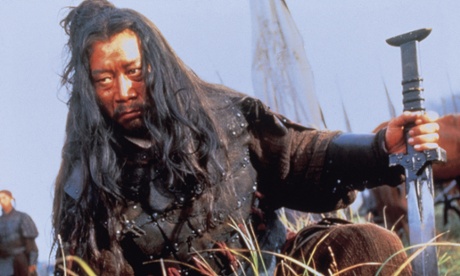
The Emperor and the Assassin (1998)
Director: Chen Kaige
Entertainment grade: B-
History grade: C-
In 227BC, an assassin called Jing Ke attempted to kill the king of Qin, Ying Zheng, who would go on to become the first emperor of unified China. Ying Zheng, who ruled as Emperor Qin Shi Huang, is perhaps best known in the west for his terracotta warriors.
Story
The story of Jing Ke has inspired TV shows, computer games and films, including Zhang Yimou’s Hero (2002). The Emperor and the Assassin is perhaps the most historically engaged cinema version of the tale in recent years. Its story comes from historian Sima Qian, who has been called the Herodotus of China. Sima’s Shiji (Records of the Grand Historian), written in the second century BC, is an essential record of events from ancient China up to the Western Han dynasty.
Politics
The film begins with Ying Zheng (Li Xuejian), who is obsessed with uniting China. “A greater empire will emerge. All people under heaven will be its subjects,” he says. “The empire will be divided into provinces under the administration of good officials. There will be peace and prosperity for all … and the Great Wall will stretch along the northern border to keep the barbarians out.” Anyone in Scotland who was following last week’s independence referendum may find this kind of talk curiously familiar. When the film begins, China was still in the Warring States period, from around 475BC to 221BC. Seven kingdoms fought for overall control.
War
For all his talk of peace, Zheng seems a lot more interested in war. Zheng unleashes siege towers, flaming projectiles, cavalry and swordsmen upon Qin’s opponents. (The movie was said to be the most expensive Chinese film at the time it was made.) Quoted in the Records of the Grand Historian, contemporary general Fan Kuai confirms Zheng’s reputation: “He had the heart of a tiger and a wolf. He killed men as though he thought he could never finish, he punished men as though he were afraid he could never get around to them all, and the whole world revolted against him.”
Romance
Zheng’s mother, the Queen Dowager (Gu Yongfei), is having it off with the exquisitely camp Marquis Changxin (Wang Zhiwen), with whose help she is secretly producing alternative heirs to the throne. Zheng’s girlfriend, Lady Zhao (Gong Li), decides to have her face branded like a criminal in order to pass as a defector, the better to set up an absurdly complicated fake assassination plot. There’s a fairly major historical sleight of hand here: the Lady Zhao referred to in historical records of the period is actually Zheng’s mother, the Queen Dowager, not his concubine. The film seems to have repurposed the name to give it a young female lead – allowing it a much stronger romantic plot to work with.
Heroics
Lady Zhao goes off to Yan, where she meets the great assassin Jing Ke (played by Zhang Fengyi, who gives perhaps the strongest performance in the film). Emotionally broken after killing an entire family to order, he now sells sandals. In a scene so convenient that even those who know zilch about ancient Chinese history will correctly sense the film-makers have made it up, Lady Zhao happens to be present when Jing Ke rescues a street urchin from being steamed alive over a giant dumpling pot. She begins to fall in love with him, and we’re all set for an entirely fictional love triangle.
Violence
Some attention is paid to Sima Qian’s detailed account (PDF) in the scene in which Jing Ke approaches Zheng with the severed head of one of his enemies, along with a rolled map that conceals a dagger. There follows an almost slapstick fight, on film as in real life. Sima also answers a question some viewers may have about why none of the king’s attendants attack Jing Ke when he tried to kill the king, instead just sort of hopping around uselessly: “According to Qin law, no courtier or attendant who waited upon the king in the upper throne room was permitted to carry a weapon of any kind.”
Verdict
The Emperor and the Assassin is a cracking set of interlocking stories, enhanced by gorgeous production design, but occasionally undermined by confusing editing. Its history, though, owes as much to soap opera as it does to the Records of the Grand Historian.
• More from the Reel history archive

